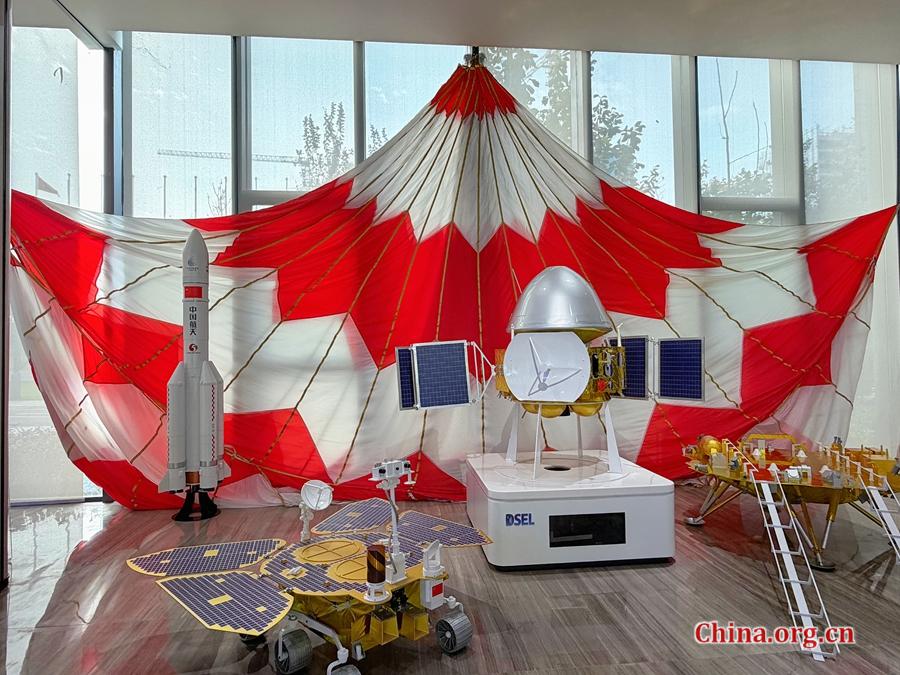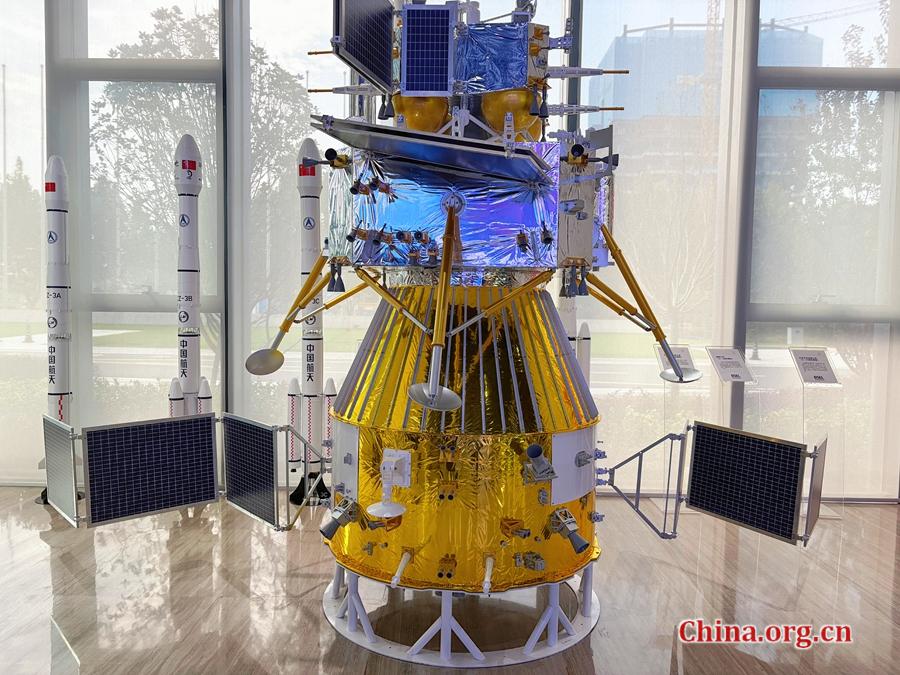
A model of Tianwen-1 spacecraft displayed at the show room of the Deep Space Exploration Lab in Hefei, central China's Anhui province, Nov. 10, 2025. [Photo by Wang Yiming/China.org.cn]
"Deep space exploration is a great undertaking for all humankind," said Wang Zhongmin, director of the International Cooperation Center at the Deep Space Exploration Laboratory (DSEL) in China's central Anhui province. "China has always upheld an open and inclusive attitude, welcoming governments, research institutions and scientists worldwide to join hands."
Wang's remarks reflect China's commitment to advancing deep space exploration through openness and collaboration.
Despite being a latecomer to space exploration, China has rapidly emerged as a key player on the global stage. From the Tianwen-1 probe that reached Mars to the Chang'e-6 mission that returned samples from the far side of the moon, the country has made remarkable progress in space science and technology during the 14th Five-Year Plan period (2021–2025), which was characterized by openness, innovation and international cooperation.
Over the past few years, China has been expanding partnerships in deep space research with institutions worldwide. Whether it be sharing lunar samples or co-developing planetary missions, China is open to collaboration in the realm of space. In April 2025, seven institutions from six countries, namely France, Germany, Japan, Pakistan, the United Kingdom and the United States, were authorized to study lunar samples collected by the Chang'e-5 mission. The country has also invited global partners to join its upcoming Tianwen-3 Mars sample-return mission, planned for 2028.
DSEL, also known as Tiandu, is among the institutions supporting this national endeavor. Co-established by the China National Space Administration (CNSA), Anhui province, and the University of Science and Technology of China, the laboratory is headquartered in the Hefei National High-Tech Industry Development Zone, with a branch in Beijing. Since its founding in 2022, DSEL has focused on strengthening China's capabilities in deep space science, engineering and international cooperation.
 A model of Chang'e-6 spacecraft displayed at the show room of the Deep Space Exploration Lab in Hefei, central China's Anhui province, Nov. 10, 2025. [Photo by Wang Yiming/China.org.cn]
A model of Chang'e-6 spacecraft displayed at the show room of the Deep Space Exploration Lab in Hefei, central China's Anhui province, Nov. 10, 2025. [Photo by Wang Yiming/China.org.cn]
In just three years, DSEL has contributed to several landmark missions, including the Queqiao-2 relay satellite and Chang'e-6, which brought back humanity's first-ever samples from the far side of the moon. The lab also supported the design of the International Lunar Research Station (ILRS), and preparatory work for the Tianwen-3 Mars mission and Tianwen-4 Jupiter mission. At its Hefei research facility, DSEL scientists are conducting frontier studies on human settlement of the Moon. They are developing technologies that are expected to be tested during the Chang'e-7 and Chang'e-8 missions, a crucial step toward building a permanent lunar research base.
In an interview with China.org.cn, Wang introduced DSEL's growing international collaboration network, highlighting the launch of the International Deep Space Exploration Association (IDSEA), the first China-initiated global scientific organization dedicated to deep space research.
Officially inaugurated on July 7, 2025, IDSEA was jointly initiated by DSEL, the Lunar Exploration and Space Program Center of the China National Space Administration, the Chinese Society of Astronautics, the Chinese Society of Space Research, and the French initiative "Planetary Exploration, Horizon 2061."
Since its inception, IDSEA has grown rapidly, bringing together 85 institutional members from over 30 countries, regions and international organizations, as well as more than 600 scientists from 60 countries. Membership is expected to reach 100 institutions and 1,000 individual researchers by the end of 2025, according to Wang.
The association will focus on lunar and planetary exploration, asteroid defense, and deep space resource utilization, while promoting high-level international academic events and broad platforms for scientific collaboration, pooling global expertise to advance deep space research and technology.
DSEL has also created platforms for continuous academic exchange and cooperation. Since 2023, it has hosted the International Deep Space Exploration Conference (Tiandu Forum). The third conference, held on Sept. 4 to 5, 2025, focused on asteroid exploration, defense and resource utilization, and served as IDSEA's first annual academic meeting.
Beyond scientific forums, DSEL works closely with universities and educational institutions across China and through the UN Regional Center for Space Science and Technology Education in Asia and the Pacific. It is also helping developing countries strengthen their technological and talent capacities through joint training, internships, and laboratory programs. The lab supports the cultivation of local aerospace professionals and promotes shared progress in global space exploration.
"Multilateral cooperation under the UN framework helps transcend geopolitical boundaries and ensures fair participation for all," Wang said. "Beyond pursuing technological progress, China seeks to build deeper synergy in humanity's quest for the stars and contribute to a shared future for all in the vast expanse of deep space."


 Share:
Share: 




 京公網安備 11010802027341號
京公網安備 11010802027341號